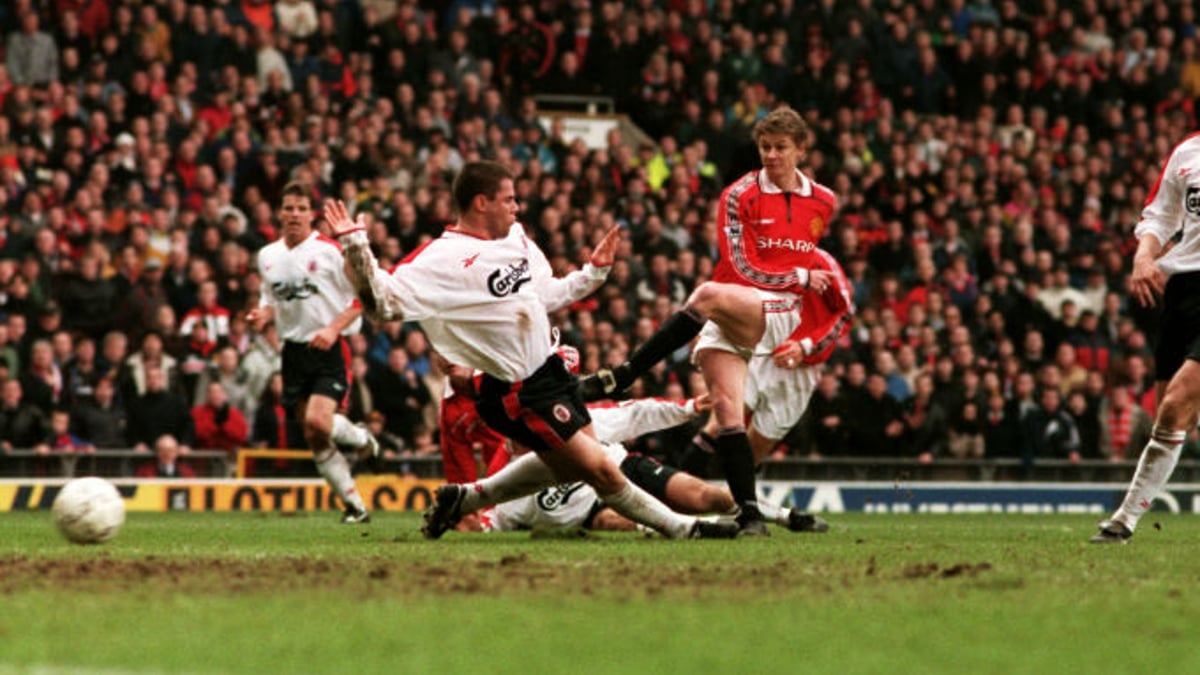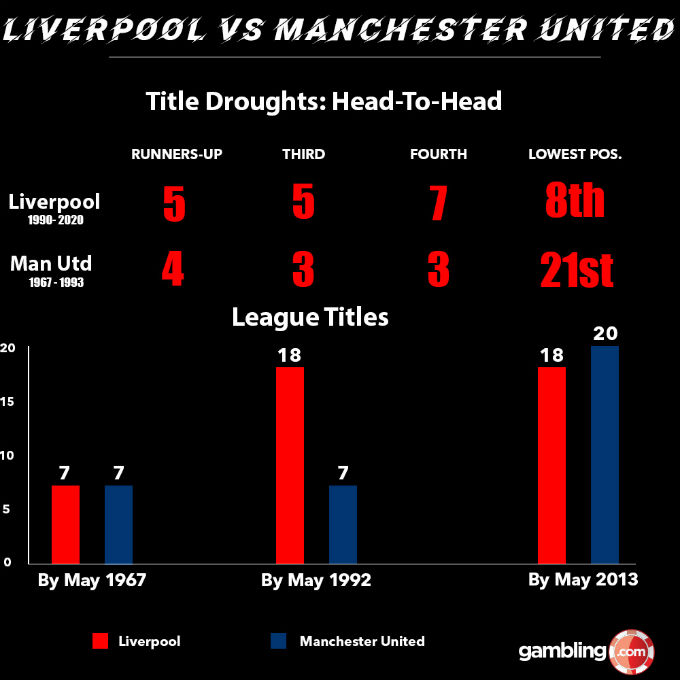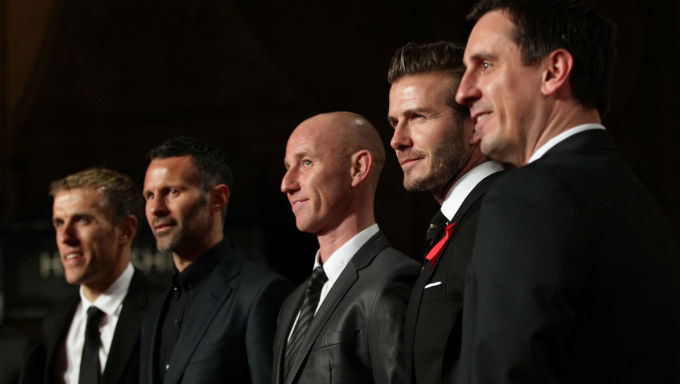Are Manchester United in a Worse Decline Than 90s Liverpool?

Liverpool were back in Premier League action on Wednesday with a 2-0 win at West Ham extending their lead at the top of the table to 19 points.
Their second-string XI may have drawn 2-2 at Shrewsbury in Sunday's FA Cup fourth round tie after leading 2-0, but the league title is the trophy Jurgen Klopp wants more than any other this season.
Barring an unthinkable collapse, the Premier League trophy will be delivered to Merseyside for the first time to give the Reds their 19th domestic title and their first since Alan Hansen lifted the old First Division title in May 1990.
- Check Out: The Latest Premier League Betting Offers
- Check Out: The Latest FA Cup Betting Offers
That was the 11th time in 18 years that the most coveted domestic trophy in English football went to Anfield and if someone had told Liverpool's legion of loyal supporters they would have to wait another 30 years to be crowned league champions again, they would have been laughed out of Merseyside.
But football is a fickle game. One minute you can be on top enjoying one of the most successful periods of English football, only for circumstances to change very quickly.
“It staggers me that it’s nearly 30 years since Liverpool won the league title, that actually blows my mind, I find it hard to comprehend,” former Liverpool defender Phil Babb told Gambling.com.

“When you think of some of the players who have been in and out of the club in that time, some of the teams that have been built that haven’t been able to win the league, it’s staggering.
“When I joined in ’94 we had some of the best British talent with Steve McManaman, Robbie Fowler, Jamie Redknapp, Rob Jones. And after that we had the likes of Michael Owen coming through, Jamie Carragher and Stevie Gerrard too – all fantastic players, but we could never quite match the strength of Manchester United.
“It wasn’t meant to be, but 30 years is too long.”
Enduring a barren spell of 30 years has been bad enough for Liverpool supporters to take, but to see their bitter enemies Manchester United dominate for over two decades in the meantime made life very difficult for Reds supporters.
In May 1993, when Steve Bruce and Bryan Robson lifted the Premier League trophy following a 3-1 win at home to Blackburn, it ended their own 26-year wait for their eighth title.
United fans hoped the good times were well and truly back at Old Trafford under Sir Alex Ferguson and indeed they were. Their optimism was rewarded with 13 titles in 21 seasons.
 Statistics: Charlie Mullan
Statistics: Charlie MullanBut now with the league title within touching distance, it's Liverpool’s turn to live in hope that they’re finally back on their perch.
The rivalry between Liverpool and United is one of the greatest in world football with 38 English titles between them – 23 of which have come in the last 44 seasons.
Both sets of fans crave success for their own team and misery for the other in equal measure.
“The games against each other were like nothing I’d ever experienced when I was at Fulham and Queen’s Park Rangers,” Paul Parker, who was part of United’s title drought-ending team in 1993, told Gambling.com.
“They were full of hate, mostly off the pitch. Maybe I was a little naïve or ignorant, but initially I couldn’t really understand it. I didn’t really know what those games entailed until I turned up on the coach.
“I’d heard stories, but until you actually go to Anfield in a coach as a Manchester United player, you really don’t understand the hate that comes from the Liverpool support.
Check Out: Latest odds and offers available at these Football Betting Sites.
Ancient Rivalry
“The games were always reasonably close. It doesn’t matter how poor Liverpool allegedly were in the 90s, they always had very good players, but we had exceptional players and exceptional match winners, that was the main difference. That’s how we gained so much momentum.”
The ancient rivalry between the two sides increased in the middle of the 1960s. In May 1966, Liverpool won the league championship for the seventh time before the Red Devils got their hands on the trophy 12 months later, taking their own total of titles to seven.
During United's 26-year drought, they suffered the indignity of being relegated to the second tier of English football with manager Tommy Docherty, but their stay in the old second division was short-lived as they won immediate promotion.
It would take 18 years for United to climb back to the top of the English football league by which time Liverpool's name had been engraved on the championship trophy 11 times since United last won it. Despite finishing runners-up four times, United's average league position from 1967 to 1993 was seventh.
Having waited so long for a return to the summit by 1993, United were in no mood to take their foot off the pedal.
 Statistics: Charlie Mullan
Statistics: Charlie MullanSuddenly, it was Liverpool's turn to be in the doldrums. Five times they’ve ended their league campaigns second in the table since 1990, but their average league position since their last title win to the present has been fifth.
They say good things come to those who wait and Liverpool fans will feel they have waited long enough for their 19th title, which could be mathematically confirmed as early as April 4 with six games to spare when they travel to nearest rivals Manchester City.
It's now seven seasons and counting since United last won the title but could they go a total of 26 years before winning the title again? And are we about to witness another period of Liverpool domination similar to their heydays of the 1970s and 1980s?
“The way things with United are at this moment in time are a lot worse than they were for Liverpool in the 1990s,” said Parker, a two-time Premier League winner under Alex Ferguson.
“That’s because United are being scrutinised everywhere, not just in the press, but by the global fanbase on social media – something Liverpool didn’t have to deal with when they were at a supposed low point in the 90s.

“Throughout that decade, Liverpool managers weren’t anywhere near as persecuted as United’s last few managers have been.
“Money has made such a huge difference. Back then, money wasn’t all that much of an issue because people still really wanted to play for Liverpool so they could still attract good players even when they were struggling. Everyone knew what Liverpool were about.”
Indeed, Liverpool broke the British transfer record for a defender to sign Babb from Coventry for £3.6 million in 1994, and the former Republic of Ireland international somewhat agrees with Parker’s claim that United are in a worse situation to what he walked into at Anfield.
“The increased pressure on the players has come about through failure to deliver performances,” he said.
“You could say United fans got complacent, but the success under Ferguson has built up this expectancy for a certain brand of football and a certain amount of silverware.
‘A Very Big Task’
“Jose Mourinho won trophies and finished second in the league, but fans still weren’t satisfied because the football wasn’t what they are used to.
“But when you’re talking about refilling the boots of Ryan Giggs flying down the left wing or Cristiano Ronaldo scoring for fun, that’s a very big task.
“They’re still the most successful club of the Premier League era, but football works in cycles and Liverpool were great in the 70s and 80s, Manchester United were great in the 90s right through to six or seven years ago.
“Now maybe it’s someone else’s time. Maybe it’s Liverpool’s, maybe it’s Manchester City’s.”
For Babb, being a player at an under-performing club with a great tradition of winning titles was tough as a collective unit, but he insists he had the head-strength to cope with the demands of being Liverpool’s most expensive defender at that time.
“From a personal point of view, I didn’t feel any pressure,” he said. “I’d been playing in the Premier League for two seasons before that, I was captain of Coventry at 22 years of age and that allowed me to deal with any pressure of moving to Liverpool fairly comfortably.

“But from the overall club’s point of view, they had gone four or five years without a league title and it seemed like a long time. There’s always pressure because Liverpool has been built on winning trophies.”
There are some similarities between Babb’s record-breaking move to Liverpool in 1994 and fellow centre-half Harry Maguire’s switch to United from Leicester last summer.
United paid a record fee of £80m for a defender when signing Maguire – Liverpool’s £3.6m fee for Babb showing a sign of the financial transformation of the game since – but, like Babb, Maguire has been thrust into a struggling team with a fanbase accustomed to success.
Surprisingly, Maguire has recently been elevated to official club captain in his first campaign, having stood in for previous skipper Ashley Young on 12 occasions this season before the 34-year-old left for Inter Milan earlier this month.
“I still question the decision to make him captain, it doesn’t always sit well with me when a new signing comes in and is suddenly the team captain,” said Parker, a former defender himself.
“I find it a little bit strange but maybe that’s just where Manchester United are. As a player, there’s still a long, long way to go with him to justify him being an £80million centre-half.”
Although Manchester United’s famed youth academy continues to churn out players who make the first team like no other club, the fans still yearn for another generation in the ilk of the ‘Class of 92’.
 (Left to right) Phil Neville, Ryan Giggs, Nicky Butt, David Beckham and Gary Neville formed much of the ‘Class of 92’ (© PA Images)
(Left to right) Phil Neville, Ryan Giggs, Nicky Butt, David Beckham and Gary Neville formed much of the ‘Class of 92’ (© PA Images)Babb can acknowledge that United were superior to Liverpool in every way throughout the 90s, but he holds no ill-feeling towards the Old Trafford outfit and believes the club is too big to lose any more ground on their Anfield counterparts, although they may have to be patient.
“Back in the 90s, Manchester United had some very good players who came out of their academy, the Class of 92 was a phenomenal group of players,” he said.
“But they also had very deep pockets as well as that appeal to get the top players on the market and were probably one of the biggest spenders despite the success of the academy.
“What’s happening now is that although Manchester United have spent big, the team just isn’t gelling well at all. The turnover of managers will not have helped.
“You can see similarities between Liverpool then and United now, but I don’t think Manchester United will go another 20 years without winning a Premier League title, I just don’t see one of those big cycles happening again.
“Yes, it’s true football does tend to work in cycles but I think they have the resources in place to put together a strategy and a philosophy to catch up with Liverpool quicker this time, and City for that matter.
“It’s a club in transition and it probably needs a shake-up from top to bottom, whereas Liverpool under Jurgen Klopp and FSG have improved the infrastructure and the recruitment and the project is really bearing fruit. In fact, it’s snowballing and gaining momentum.
“You’d have to say United are three or four years behind them.”
From a United perspective, Parker isn’t quite so optimistic, pointing to Liverpool’s recent 2-0 win over Ole Gunnar Solskjaer’s side as an alarming sign of the current gulf between the two teams.
“In a way, the 2-0 scoreline flattered United,” he said. “There were some periods of unbelievable pressure from Liverpool and good fortune favoured United.
“You could see a big difference in the quality of the individuals and the quality of the actual team as well. They’ve got a long way to go before they can get near Liverpool.”
👀 Liverpool now have more than double the points of 5th place
— Gambling.com (@gambling_com) January 30, 2020
💪 Liverpool 19 points clear with 14 games to play
😬 Just 11 points between 5th and the relegation zone
Premier League Betting: https://t.co/iWkQAl5PII#lfc #mcfc #cfc #lcfc #mufc #watford pic.twitter.com/bAcpdbuNK2
Woodward Out?
Parker has little faith that United, under their current recruitment set-up with Executive Vice-Chairman Ed Woodward at the helm, have the right people in place to oversee a comeback.
“It’s about being able to spend well at the allocated times rather than just fill holes in the hope that they can somehow qualify for the Champions League,” he said, referring to multiple uninspiring transfer rumours with just days left in the January transfer window.
“They can’t just rely on the name, history and pedigree of the club to be enough. It’s all driven by money, and what’s causing Manchester United problems at this moment in time is poor investment.
“With investment, you need to make the right choices, and United’s recruitment has not been good enough. At the moment, you can’t look at United and predict that they’ll catch Liverpool up again within four or five years because the people in charge are not spending money well.
“When they have spent money, it’s mostly been spent on poor players. Recruitment since Sir Alex Ferguson retired has been very, very poor – and that’s an understatement.”
 (L-R) Alex Ferguson, who masterminded United's rise in the 90s, pictured with under-fire Executive Vice-Chairman Ed Woodward (© PA Images)
(L-R) Alex Ferguson, who masterminded United's rise in the 90s, pictured with under-fire Executive Vice-Chairman Ed Woodward (© PA Images)Meanwhile, disillusioned Manchester United fans are planning a protest against the club’s owners – the Glazer family – in their next home game against Wolves on Saturday, but Parker believes the American entrepreneurs will only leave the club when profits dry up.
“The owners look at Manchester United as a modern-day ATM to give them money,” he said.
“Are they just going to walk away from that? No, they’re not, because it’s a good income and one that continues to grow off the field.
“But for how long will it continue to grow off the field while United are not winning trophies and not competing on the pitch? It can’t last forever.
“People are allowed to demonstrate and if they demonstrate in the right way then it can make a difference, but this talk of fans walking out in the home game against Wolves – I worry about things like that.
“That’s a big game, they’re both chasing the Champions League positions. If the game is still finely poised with 30 minutes to go, are the home fans really going to walk out on their team?
“In my opinion, that’s not the right thing to do. You should want your team to win games and this is a big one, so they shouldn’t be walking out.
“It’s also the match the club will be commemorating the Busby Babes at too, so when you factor that into it, it seems like the timing is just not right.”
Indeed, there are a lot of things that are ‘just not right’ about Manchester United at this moment in time, but only time will tell how long they’ll have to wait for their next league title this time around.










